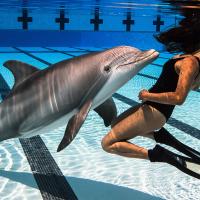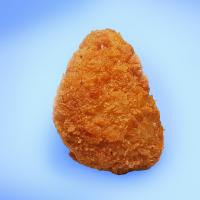Can seaweed make plant-based burgers healthier and more sustainable?
Akua is betting on it. Since 2016, the food startup has been using ocean-farmed kelp to produce meat alternatives: kelp jerky, kelp pasta, and — its main product — kelp burgers. With fans like Richard Branson and a special mention on TIME’s “Best Inventions 2019” list, Akua is part of a broad movement to phase out animal meats, which are sometimes less healthy than plant-based alternatives, and almost always more environmentally destructive to produce.
“One of the biggest challenges that the human population is facing today is creating food at scale that does more good for the planet, and is affordable, healthy and delicious for humans,” Courtney Boyd Myers, CEO and CMO of Akua, told Freethink.
For Akua, tackling that challenge started with discovering the potential of regenerative ocean farms.
One of the world’s fastest growing species
Humans have been eating seaweeds for centuries. It was so common to the Japanese diet in the 8th century that the government allowed people to pay taxes with it. Today, the nation produces every year billions of dollars worth of nori, a type of dried edible seaweed used to hold together sushi. But nori is just one type of seaweed, arguably the most familiar.
Seaweed is a broad term that refers to thousands of different types of marine plants and microalgae. Some are edible and healthy, others are toxic. Seaweeds are harvested not only for food, but also because they contain components used to make products like emulsifiers, dyes, gels, and cosmetics, to name a few.
Akua’s main ingredient is kelp. Often billed as a seagreen or sea vegetable, kelp is a type of seaweed but it’s technically not a plant because it doesn’t possess multiple types of clearly defined tissues. But kelp does share key traits with leafy vegetables, one being that it grows through photosynthesis.
Kelp is considered a protist, which is an organism that’s not an animal, plant, fungus, or prokaryote.
To grow kelp, aquafarmers attach kelp seeds to lines attached to buoys, submerge the lines about 8 feet below the ocean’s surface, and harvest the product as soon as two months after setting out lines. (Kelp is one of the fastest-growing species in the world, with some species able to grow 2 feet per day.) Kelp doesn’t need food from farmers. It can grow rapidly as long as it’s submerged in nutrient-rich cold water with access to sunlight.
“Unlike anything that you eat or drink today, kelp is a zero-input crop,” Boyd Myers told Freethink. “It doesn’t require dry land, fresh water, or feed to grow abundantly.”
In fact, farming kelp can have regenerative effects on the environment: Because the macroalgae grow through photosynthesis, they capture carbon that enters the oceans from greenhouse gases in the atmosphere. As greenhouse-gas emissions have soared over the past century, it’s steadily made the oceans more acidic. In recent years, researchers have been exploring whether kelp forests could help deacidify coastal ecosystems, providing healthier habitats for many forms of marine life. In terms of improving human health, kelp also seems to have clear benefits.
The nutrition of plant-based burgers
Over the past decade, companies like Beyond Meat and Impossible Foods have been steadily changing public opinion on meat alternatives. In the past two years, the plant-based food industry has grown 29% to a total market size of $5 billion, with meat-alternative products landing in major stores like Whole Foods, Burger King, and Walmart.
Meat-alternative companies leave a much smaller impact on the environment than do conventional meat producers. That’s mainly due to livestock: Cattle are the planet’s leading agricultural source of greenhouse gases, with a single cow belching approximately 220 pounds of methane into the atmosphere every year.
Meat-alternative companies cut cattle burps — and they’re suffering — out of the equation.
A 2018 study from researchers at the University of Michigan found that producing a plant-based Beyond Burger generates 90% less greenhouse gases, takes 46% less energy, and has 93% less land impact than producing a beef burger.
But the relative health benefits are less clear cut. Although plant-based products like Beyond Burger and Impossible Burger contain decent amounts of protein, minerals, and vitamins, they’re also heavily processed, packing about the same amount of saturated fat as beef burgers, and about four times the salt. It’s a good deal for the environment, but not always for our health.
“My fear is that, in trying to solve for one problem, which is protecting animals, [meat-alternative companies are] creating a new problem, which is this sort of Frankenstein, unhealthy, overly processed product,” Boyd Myers told Freethink.
Akua aims to make plant-based burgers that are healthy for both the environment and our bodies.
Kelp contains Vitamins A, B6, E, and K, and also minerals like Zinc, Calcium, Potassium, and Iron. Studies suggest that the components within kelp can help with medical conditions, including iodine deficiency, diabetes, and obesity and liver problems. While not conclusive, there’s also some evidence suggesting a type of macromolecule contained in kelp can protect against cancer.
The combination makes for a burger that’s “chewy, salty, and smoky, and while nothing about the taste screams “seaweed,” there’s definitely a note of brine in there,” wrote Amanda Shapiro for Bon Appetit. Also unique about kelp-based burgers: The cell structures of the macroalgae developed in cold water, meaning you can freeze them and refreeze them without damaging the patties.
In addition to kelp, Akua plant based burgers also contain mushrooms, pea protein, quinoa, black beans, chickpea flour, and seasonings.
Akua plant based burgers are currently available in more than 40 stores across the U.S., and they’re available for delivery in frozen packages, with a 12-pack running for $48.99. That might be a bit more expensive than most beef and a bit pricier than plant-based burgers like the Impossible Burger, but prices of kelp-based food products could drop as the industry continues to scale.
A 2020 report from the research firm Global Market Insights projects the global commercial seaweed market to grow 12% by 2026, reaching a value of $85 billion. Kelp will drive much of that growth, the report noted.
In addition to creating more jobs along American coastlines, Boyd Myers hopes the burgeoning kelp industry can spark shifts in how we think about food.
“My hope for the future would be for every human being to ask questions about what they’re eating: Where did it come from, how was it grown?” Boyd Myers told Freethink. “We hope more than anything that our products can start to create these subtle mind shifts, and that’ll translate into other areas of their life, too.”


